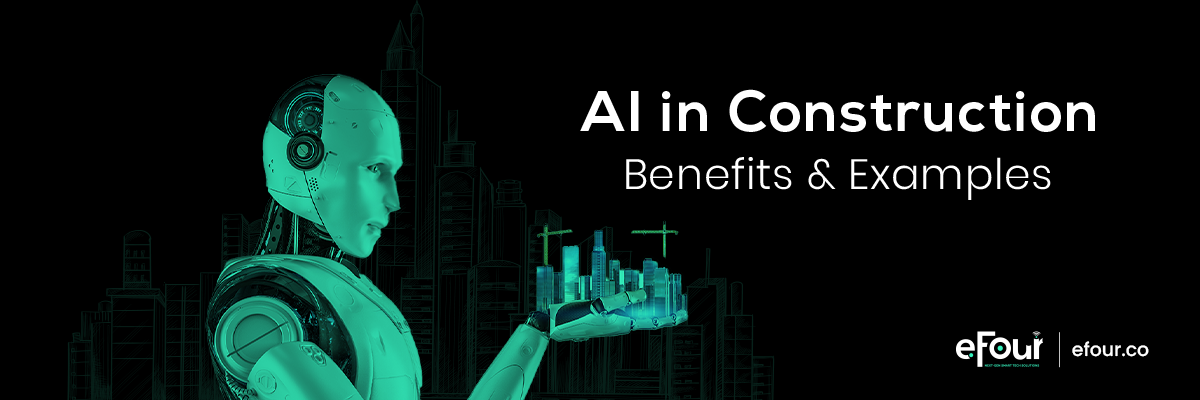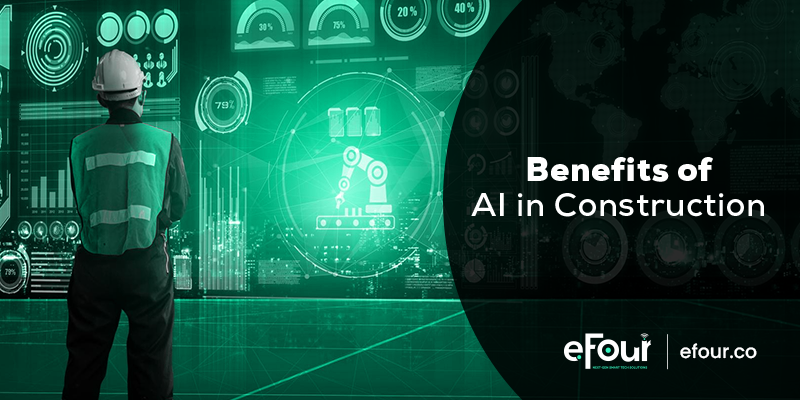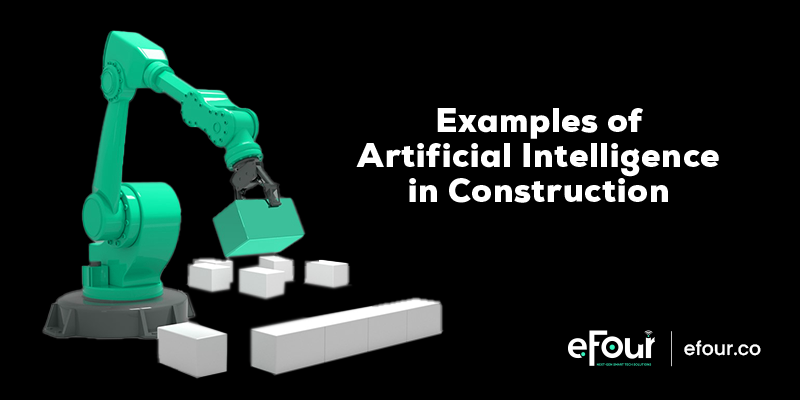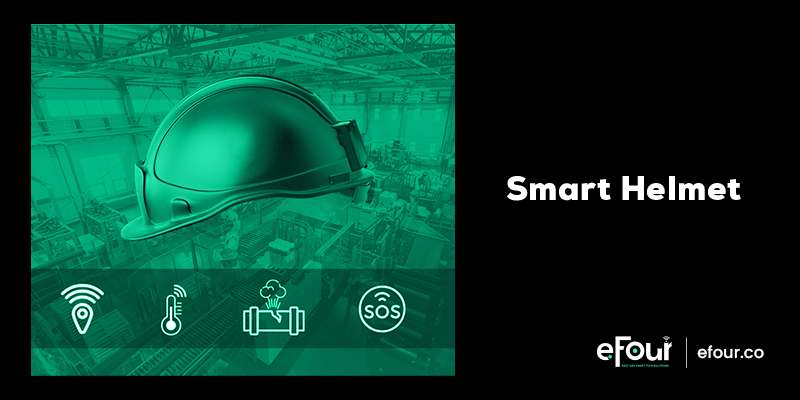
The construction industry is rising, and experts predict it will get up to 14.4 trillion U.S. dollars by 2030.
A part of the credit for such steady growth goes to artificial intelligence (AI) in construction.
Did it shock you?
AI is not just helping the healthcare and IT industry; it has also been aiding construction business owners to choose smart work. It has helped the industry to get bigger and safer.
So, if you are a construction company owner, you will find out how AI can help you overcome the challenges of your construction projects.
In this blog, we will discuss the benefits AI offers to the construction industry and examples of using AI in the present day.
Table of Contents
- 1. Benefits of AI in Construction
- 2. Examples of Artificial Intelligence in Construction
- 3. How efour Can Help Deploy AI in Construction
- 4. Future of AI in Construction
- 5. FAQs
Benefits of AI in Construction

One of the reasons for artificial intelligence being everywhere you look is that it brings a plethora of direct and indirect benefits. Businesses from various industries are either using AI already or planning to leverage it.
Wondering what those benefits are for the construction industry?
Risk Management
One of the biggest challenges of the construction industry is a risk. The risk of accidents, project timeline delay, and cash flow breaking are some significant risks. Handling and quantifying these risks is a mammoth task, let alone mitigating them.
Thus, relying just on humans to calculate all the variables and make correct decisions every time will not be a wise step. However, we can quickly mitigate those risks with the help of artificial intelligence. AI-driven robots can do construction-related tasks that are far more dangerous for humans.
For example, bar bending. AI robots can do that more safely, quickly, and consistently than humans. This is how AI mitigates the risk of workers getting injured, projects getting delayed, and quality getting hampered simultaneously with just one solution.
Cost
The construction industry is one of the costliest industries. The builder group has to invest huge capital even to get started. Thus counting every single penny gets crucial.
Only if it was as straightforward as said. A construction company has to consider numerous factors to get to the project’s cost. And it does not end here. In most cases, they have to assume the charges, and that’s why it is called an estimate, right?
So, AI software contemplates all the factors, process mountains of data, calculate numbers, and formulate complex equations to help construction companies create estimates as precisely as possible. And precise estimates let them know where they can cut expenses and bring the overall project cost down.
And the cherry on top of the cake is that it takes way less time than what a human estimator would.
Furthermore, AI products like smart switches help you control the entire site and office appliances to minimalize power consumption.
This is how AI is helping builders make more profit than they used to in similar projects.
Read more about AI Pricing here.
Construction Safety
Undoubtedly, Artificial intelligence has benefited the construction industry by ensuring safety. The robots and software based on AI have made site workers’ jobs safe by ensuring the site complies with the standards.
Earlier AI, there was no effective way to track if the workers were wearing their protective gear and following the protocols. Now, you can easily track every worker to ensure safety. Moreover, robots assist workers in focusing more on the critical part of the job without worrying about mundane tasks.
It’s pretty common for a human to miss out on minute details, but AI-powered cameras can scan the entire site and detect safety violations like misplaced equipment, weak safety net, and improper storage of engineering and construction materials.
Examples of Artificial Intelligence in Construction

Robot-made Construction
If you imagine a building built by an army of robots, you are a few years ahead in the future. For now, AI-driven robotics is there to assist human workers on sites. Robots do not replace humans but enhance productivity.
For example, here are some of the AI robots in the construction industry with their use.
| Robot | Use |
| Bricklaying robot | Assis in laying bricks precisely by calculating the wind force and vibrations. |
| Demolition robot | Brings down structures without the need for a human presence at the site. |
| Autonomous vehicle | Carries and delivers equipment, materials, supplies, and heavy loads to different parts of the site. |
| Autonomous concrete floor robot | Lays concrete on floors without putting workers at risk. |
| Drywalling robot | Drywalling without a drywall expert’s supervision. |
Other than accuracy, another advantage of using robots in construction is time-saving. Robots help civil engineers to plan and execute the entire project more swiftly than the traditional way.
And you know time is money, right?
Wearable Tech
As we discussed earlier, AI-enabled tech devices help project managers to track workers’ productivity. And the wearable AI devices are precisely how.
The IoT-based smart helmet is one of the best examples of wearable technology. Its application does not limit to employee safety, but it helps engineering and construction companies track workers’ activities on the site.

It has various sensors to detect
And not only that, but it also has an SOS button for emergencies.
Several other AI-powered wearable sensors have been proven a boon to the construction industry, letting companies manage the entire project effortlessly.
And talking about managing projects effortlessly, let’s see how artificial intelligence helps construction companies manage their projects.

Know How Wearable Tech Can Transform Your Construction Business
We provide customized AI-based devices to make your job effortless.
Project Management Tools
Managing a construction project is tough, right?
Managing the entire project on your own is next to impossible.
That’s why you work in a team and try to make the project as seamless as possible. But, having more teammates does not necessarily mean smooth work. Coordinating a team can be quite challenging too.
And as soon as we hear the word challenge, we tend to look at AI for the answer. And AI has never disappointed us.
Along with robotics, devices, and tools, AI empowers software that transforms how sites functions. This software help construction managers with operations and asset management.
Moreover, you can hire the best web and software development company to get customized AI-based software for your construction project. AI is intelligent enough to learn specifically your project challenges and create a workflow for the best outcomes.
This trend is on the rise because it adds transparency to work.
BIM
The construction industry is one of the industries that sell a product even before it is made.
We know, making your prospects visualize how the construction will look when it’s entirely constructed. After all, they can’t study engineering drawings like you.
Therefore, AI is again at the rescue. Building Information Modeling (BIM) is a software that helps you create 3D modeling and generative design of the structure. The part of AI technology called machine learning (ML) has made it easy to read and study huge chunks of data and create BIM designs.
It doesn’t need you to have civil engineering knowledge to create a design. So now, you can easily pitch your structures to prospects and help them show (not visualize) how the structure will be in some time.
Well, of course, this doesn’t end at sales pitches. BIM helps you create the 3D model for every stage of the construction process to understand the structure design better and to even test it for strength and resistance.
Data Analysis
Do you prefer watching paint dry over dealing with heaps of pages dipped in data?
Well, we know that’s not the most fun job.
So, let’s introduce you to machine learning (ML). It is a part of artificial intelligence technology that loves data analytics. It studies big data and processes it in seconds. ML is made for data mining, and it helps the construction industry by analyzing databases for inspection reports, payroll, work schedules, financial reports, equipment maintenance cycles, inventory, and whatnot.
A human might miss out on noticing detailed patterns in such data, but machine learning can pinpoint insights that help you to take action and save money and time. It helps to find errors and make your project run smoother. That’s not all; it can bring you the data you want faster than any human can.
Machine learning is especially liked by safety managers and finance managers because it helps to predict potential safety hazards and cost overruns coming on the way by running predictive analytics. With warnings like those, you can avoid scenarios that can even bring the project to a halt.
Fleet Management
Can you answer the following questions right now?
Where has the transit mixture reached right now?
How long would the new batch of cement take to reach the site?
Where is the excavator working right now?
If not, you most probably need AI right at your site.
Internet of Things (IoT) is a technology that can help you keep track of all such machinery, equipment, and vehicles. By tracking the exact location and working status of the things, you can manage resources at your site better than ever before.
This is how IoT has revolutionized how sites manage fleets. You don’t have to bother calling the equipment in charge to know the status.
Other than that, IoT tags and devices let you operate the equipment from anywhere in the world. This enables you to make the processes quicker and achieve the target construction goal sooner.
GIS & GeoAI
How about a bird’s-eye view of the whole site?
The construction process starts with surveying the land to be worked on. Thus, Geospatial Information systems (GIS) and Geospatial AI with drones have made aerial surveys affordable. In the older days, you need to hire an aircraft for the same task. Now, just a drone can do it better.
The surveys let you plan the entire site construction and know the site’s topography.
Now, this was before the actual construction began, so what about during the construction stage?
AI-powered drone surveys are best for having a regular status check of the project progression. Just fly it up in the sky; it will cover all the site areas and help you track the activities.
These surveys on regular periods can give you progress reports as well as an estimated finish time. These reports help you make better decisions to schedule your project events and expect the desirable outcomes.
These surveys also help spot challenges that cannot be seen from the ground level. For example, it gives you an idea of how your site excavation might affect the nearby structure.
How efour Can Help Deploy AI in Construction
The construction industry has cut-throat competition in this era. If you are not leveraging the abilities of new generation technologies, you will get out of the competition sooner or later.
If you are here for the long run, you need to walk with the time, if not ahead. Especially when adopting new technology is this simple.
Yes!
You read it right!
It is simple. You don’t have to do it by yourself.
All you have to do is to let us help you.
We at efour, help construction companies get the best out of artificial intelligence for their projects. As we have been providing AI development services since 2011, we now have expertise in creating AI solutions for construction firms that want to smartify their sites.
We are the one-stop shop you need to enter, be it machine learning, the internet of things, embedded technology, or AI product development. Whether you want AI solutions for your small, mid, or large-scale construction projects, we are here to change how you view construction.
Future of AI in Construction
Artificial intelligence has engulfed the construction industry already. The industry is seeing new horizons of growth and capabilities to do much more than traditionally they could have. So, it is pretty evident that the future of AI in construction is relatively prosperous.
More and more businesses will jump on the bandwagon as soon as possible.
If AI keeps spreading at the present rate, it might not be hard to imagine robots taking over the site. Right now, robots assist humans on the site, but the role reversal is not too far in the future. Robots will do most of the work, and humans will be there to assist them.
Keeping our imagination aside, one thing is for sure, this is the right time to catch up with the AI. The companies that deploy AI will improve efficiency and quality of work which will help them become industry leaders.
So, what are you waiting for? Let efour futureproof your construction company.
FAQs
Construction professionals are now working with multiple types of robots to achieve better quality and quantity of work. Here are a few types of robots used in the construction industry.
Here are the latest trends in the construction industry.




